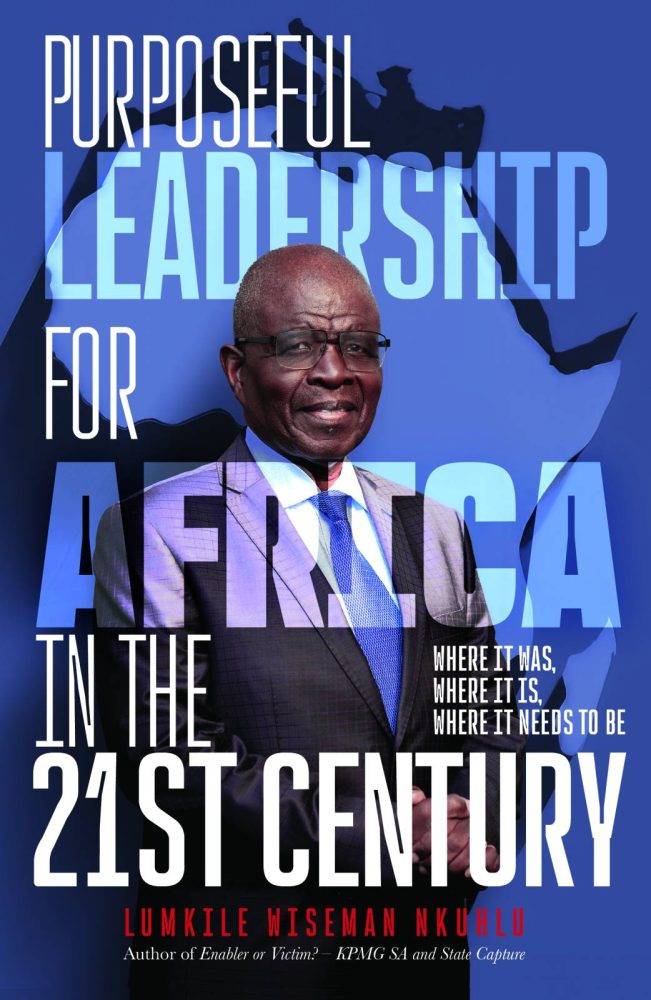
Showing the way: Lumkile Wiseman Nkuhlu, author of Purposeful Leadership For Africa in the 21st Century.
Lumkile Wiseman Nkuhlu has written a most timely and inspirational book that systematically tackles the most significant constraints to Africa’s ability to claim the 21st as an African century — purposeful leadership.
Africa has the natural, mineral and cultural assets to become the most sustainably prosperous, dynamic and innovative continent on Earth. Purposeful, ethically sound, skilled and accountable leadership is the missing key to the desired future.
Nkuhlu has done an excellent job in this book by providing a succinct source of information about the history of the African continent, including the much-neglected ancient history that documents it as the cradle of humanity and of the first human civilisation.
This book is essential reading for all African citizens seeking to understand where we come from, how we got where we are and how we might learn from other continents, especially Asia, to reimagine and shape the future we desire.
The central feature of the analysis is that Africa missed the benefits of the waves of scientific and industrial revolution that swept Europe and North America in the 18th and 19th centuries. These missed opportunities made Africa vulnerable to extractive imperial agents who used access to more sophisticated lethal weapons to conquer it.
The clash of civilisations and value systems, between ubuntu and extractive imperialism, added to Africa’s vulnerability.
Indigenous peoples in Africa, and other parts of the world, who had retained the essence of ubuntu values, became vulnerable to those who they welcomed as strangers who took advantage of their generosity.
Ubuntu, understood as the essence being human interconnectedness and interdependence within the web of life, exposed Africans to becoming victims of colonial conquest by societies such as Europe that had adopted survival-of-the-fittest value systems.
Both the indigenous Khoi and San peoples of South Africa and indigenous people of the Americas paid a heavy price for welcoming shipwrecked Europeans. They lost their land, intellectual property and their freedoms as human beings with rights and responsibilities.
Slavery and dispossession undermined Africa’s opportunities to build on its considerable scientific and technological prowess embodied in the first Egyptian, and other African, civilisations.
The book provides detailed, researched information, as well as the firsthand experiences of an author who was in the right place at the right time.
He was intimately involved in the evolution of both the African Union Charter and the New Partnership for Africa’s Development.
Nkuhlu is sensitive to, and respectful of, the achievements of the main historical actors of the African renaissance and union, without holding back from pointing to missed opportunities by those actors.
For example, he identifies the failures of both president Thabo Mbeki of South Africa and Nigeria’s Olusegun Obasanjo to model the African renaissance in the governance and development pathways of their own countries as living models.
This was a fatal flaw that undermined the sustainability of these initiatives beyond the terms of office of both leaders.
The book deals deftly with the critical issue of the need for Africans to transcend the icy hand of the traumatic legacies of conquest, slavery, dispossession and humiliation to enable the emergence of successful, capable leaders, inspired by a just cause, who reflect the principles and values of the people they lead.
The leadership capabilities outlined in the book bear repeating: personal mastery — self-awareness, imagination, ethics and independence — and a scientific mindset open to innovation and experimentation. These promote the design of meritocratic governance to enable effectiveness in achieving set goals without compromising future generations.
Nkuhlu does not hold back his criticism of South Africa’s missed opportunities to effect transition to a prosperous, inclusive and just society.

Both presidents Nelson Mandela and Mbeki wrestled with the challenges of loyalty to the ANC and its long traditions and practices designed for a liberation movement, not a governing party.
The question of which interests should take precedence — the party or the state representing all citizens — troubled both.
The failure to put the interests of all South Africa’s citizens above those of the party lies at the heart of the cancer of state capture that has undermined our country’s institutions and its fortunes.
The trouble can be traced back to pursuing a political settlement in the hope that socio-economic transformation would follow.
The extractive global economic system that post-apartheid South Africa embraced exacerbated the inequalities and inequities endured by more than 60% of citizens. We need a new socio-economic development model.
The book concludes with an urgent call. Africa is ripe for patriotic political activists, scholars and professionals to emerge and drive transformative action.
Africa needs the success story of a big country like South Africa.
Our country has huge potential to demonstrate the power of visionary, patriotic leadership to inspire a transformative movement to create a just society with sustainable prosperity for all. Nkuhlu’s invitation is open to all freedom-loving Africans.
Are we ready?
Purposeful Leadership For Africa in the 21st Century by Lumkile Wiseman Nkuhlu is published by Tracy McDonald.